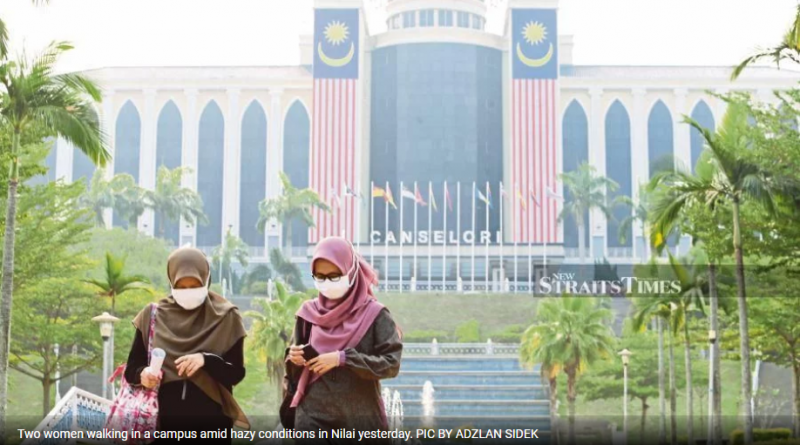M’sia, Indonesia and S’pore should bring those responsible for forest fires to justice
KUALA LUMPUR: A JOINT investigation team (JIT) should be set up by Indonesia, Malaysia and Singapore to find and bring those responsible for the forest fires in Sumatra and Kalimantan to justice.
Sustainability expert Dr Mohd Yusoff Ishak said Malaysia and Singapore had to band together to impress on Indonesia the urgency of getting this done.
“The JIT is one method. The lead investigators should be from independent environmental bodies or organisations, such as Greenpeace, that are associated with climate change,” he said, adding that the steering team must not have links to any of these three countries to come up with neutral findings.
Yusoff did not discount the possibility of roping in agencies such as Interpol to be part of the JIT.
“This time around, it can’t just be small planters that are doing this. I believe that part of this is due to big corporations allowing such incidents.
“That’s why we need to have a multi-pronged strategy, where we target big companies that allow their plantations to be burnt,” Yusoff, who is from Universiti Putra Malaysia, told the New Straits Times.
He also said big firms facilitating smallholders by way of buying from them or funding their smallholdings had to be probed.
Yusoff said the tripartite should then press charges based on the findings of the JIT and subsequently drag the culprits to court.
He was drawing on Singapore’s move to prosecute some of its companies that caused transboundary haze some years ago.
“This is something that Malaysia has to be prepared to do because we have a large number of Malaysian-run corporations in the affected areas.
“(Overall) we need the (Indonesian) republic to be proactive in terms of planning ahead to ensure there is no haze in the future. Hence, they need to go after both the big corporations and smallholders to make this happen.”
Yusoff said this was because the last pledge from Indonesia came about after the 2015 haze crisis, when the republic had promised that there would be no more open burning and smog arising from burning activities.
The tripartite involving Malaysia, Indonesia and Singapore collapsed before falling by the wayside after a three-month long crisis as there were no serious incidents of haze following 2015.
He said Putrajaya had to take a firm stand as the public were weary of the excuses given by Indonesia that had largely been seen as only reacting to the haze.
Yusoff said Malaysia also missed an opportunity to extract a commitment from Indonesian President Joko Widodo on the matter when he was in Malaysia last month for a bilateral visit.
Asked if the government could give an ultimatum and threaten to impose sanctions or take Indonesia to the International Court of Justice if the problem persisted, the lecturer said that would be the “very last straw”.
He said taking Indonesia to court, for example, could only be viable if Singapore took a cohesive stand with Putrajaya.
“We can’t do it alone,” he said, adding that the government also needed to conduct a social impact analysis on the impact of the haze on public health, the environment, economy, agriculture, tourism and aviation to back the suit.
Yusoff, however, said instead of going on the offensive, the two countries could leverage the grave impact of the smog on public health and the economy to get an affirmation that this would be the last of the dreaded yearly smog.
“This can be done by the prime minister charismatically, instead of sanctions and going to the ICJ.”
Economist Dr Mohd Nazari Ismail agreed that such actions should only be taken as a last resort.
“Sanctions done by neutral international bodies may work, but a threat from a neighbouring country can lead to diplomatic trouble and is not advisable.”
Asked about banding with Singapore to take errant companies to court or summoning Indonesia to the ICJ, he said any action minus the involvement of Indonesia would be deemed as undermining Indonesia’s sovereignty.
“We should try to work with Indonesian authorities on the matter.”
Sunway University Business School economics professor Dr Yeah Kim Leng said sanctions would not work.
“Not only that, such actions may irreversibly damage the generally strong and harmonious relations between neighbouring countries.
“We need a multi-pronged approach involving the government, the private sector, non-governmental organisations and concerned interest groups and high-powered individuals to prod the culprit country into more concerted actions against forest burning.”
Recently, former natural resources and environment minister Datuk Seri Wan Junaidi Tuanku Jaafar had called on Energy, Science, Technology, Environment and Climate Change Minister Yeo Bee Yin to act immediately on the recurrence of the haze.
He was quoted as saying that in the past, a multi-agency committee comprising the Meteorological, Environment, Fire and Rescue, and Health departments, as well as the police, army and representatives from state agencies would be formed to address the issue.
The committee, he said, would give the mandate to the Department of Environment to establish contact with its Indonesian counterpart and exchange information on the most effective diplomatic solution when it came to the transboundary haze issue.
Yeo, on Tuesday, said she and other ministry officials and Foreign Ministry officers had reiterated their concern on the impact of persistent transboundary haze on the public.
She said Malaysian ambassador to Indonesia, Zainal Abidin Bakar, had met Indonesian senior officials on Monday to discuss the transboundary haze affecting Malaysia.
She said the Indonesian government had conveyed its commitment to manage the haze by deploying close to 2,900 personnel and 1,677 volunteers to douse the forest fires.
Source: NST



